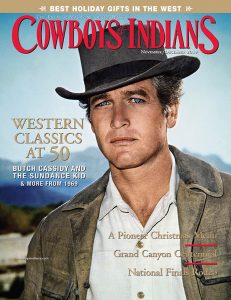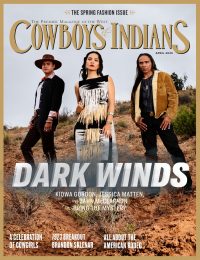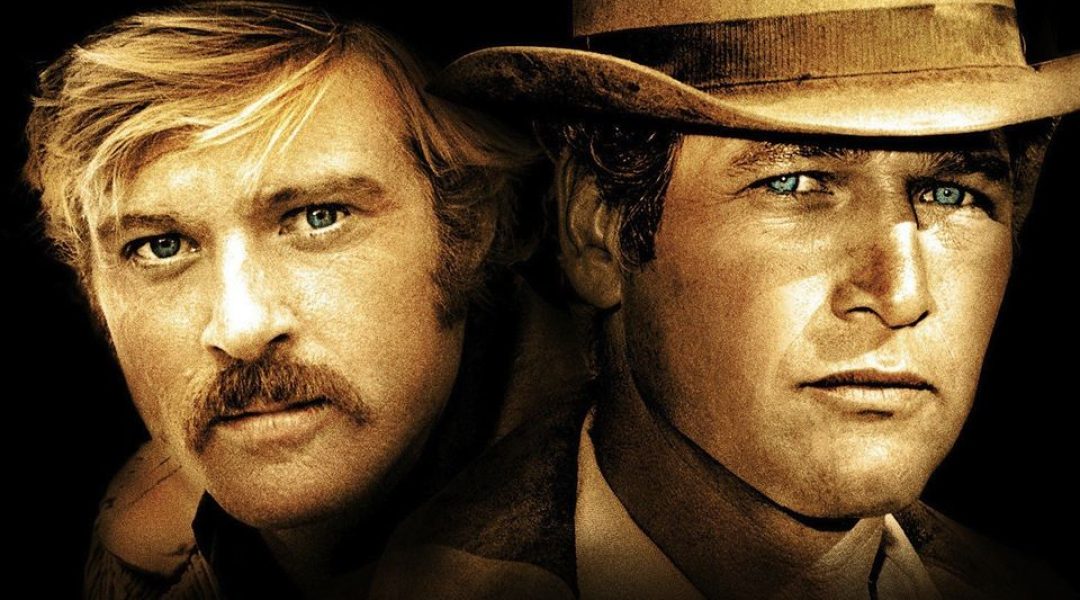We look back at the classic 1969 Redford-Newman film for its 50th anniversary.
Editor's Note: C&I is celebrating the golden westerns of 1969, a year that changed the game for the beloved film genre. Check the Entertainment tab to see 25 film recommendations by C&I senior writer Joe Leydon. The November/December 2019 print edition prominently features this selection on its cover.
It's easy to forget that, back in 1969, most critics were downright frosty toward Butch Cassidy and the Sundance Kid.
 Some scribes were confounded by scriptwriter William Goldman’s artful commingling of melancholy revisionism and tongue-in-cheeky playfulness (“Who are those guys?”) while others complained mightily about director George Roy Hill’s refusal to sustain a consistency of tone in his seriocomic western. Time magazine’s unidentified reviewer was especially incensed by Burt Bacharach’s pop-flavored musical score — which included, of course, the song “Raindrops Keep Falling on My Head,” sung by B.J. Thomas—claiming it made the movie “as absurd and anachronistic as the celebrated Smothers Brothers cowboy who played the kerosene-powered guitar.” (Bacharach, it should be noted, earned an Oscar for his handiwork, as did Goldman and cinematographer Conrad L. Hall.)
Some scribes were confounded by scriptwriter William Goldman’s artful commingling of melancholy revisionism and tongue-in-cheeky playfulness (“Who are those guys?”) while others complained mightily about director George Roy Hill’s refusal to sustain a consistency of tone in his seriocomic western. Time magazine’s unidentified reviewer was especially incensed by Burt Bacharach’s pop-flavored musical score — which included, of course, the song “Raindrops Keep Falling on My Head,” sung by B.J. Thomas—claiming it made the movie “as absurd and anachronistic as the celebrated Smothers Brothers cowboy who played the kerosene-powered guitar.” (Bacharach, it should be noted, earned an Oscar for his handiwork, as did Goldman and cinematographer Conrad L. Hall.)
But even the naysayers couldn’t deny the irresistible chemistry generated by superstar Paul Newman and rising-star Robert Redford as the title characters Goldman described as “this affable goof ” (Butch) and “this lethal killer” (Sundance): Two rollicking, wisecracking outlaws who can’t ride far or fast enough to escape their own obsolescence. Decades later, while interviewed for a making-of documentary, Redford credited Newman as the dominant factor in that casting equation:
“Paul and I began a process of bonding during the first few days [of production]. We found a common bond of humor and values off the set that could be carried into the work on the set. It stripped away, almost immediately, the age difference of 13 or 14 years between us, and the professional notoriety difference between us. That was stripped away pretty quick. And it was Paul who did that. He just accepted that we were colleagues working together as actors. And that meant a lot to me. What developed between us — we never questioned it.”
Newman and Redford (along with Katharine Ross as Etta Place, the lovely schoolteacher who’s fond of both outlaws) are immensely appealing in their comical interactions. But even during the movie’s most hilarious scenes, there are unmistakable undercurrents of danger and dread. Because, not unlike The Wild Bunch, Butch Cassidy and the Sundance Kid is at heart, in the words of Richard Schickel, one of the few critics who “got” the film, a story about “the closing of our western frontier and the consequent technological disemployment of its bandit population.” And we get fair warning at midpoint that this story won’t have a happy ending when Butch and Sundance visit a friendly lawman (Jeff Corey) to seek career advice.
“I never met a soul more affable than you, Butch” says the lawman, “or faster than the Kid. But you’re still nothing but two-bit outlaws on the dodge. It’s over. Don’t you get that? Your times is over. And you’re going to die bloody. And all you can do is choose where.”















